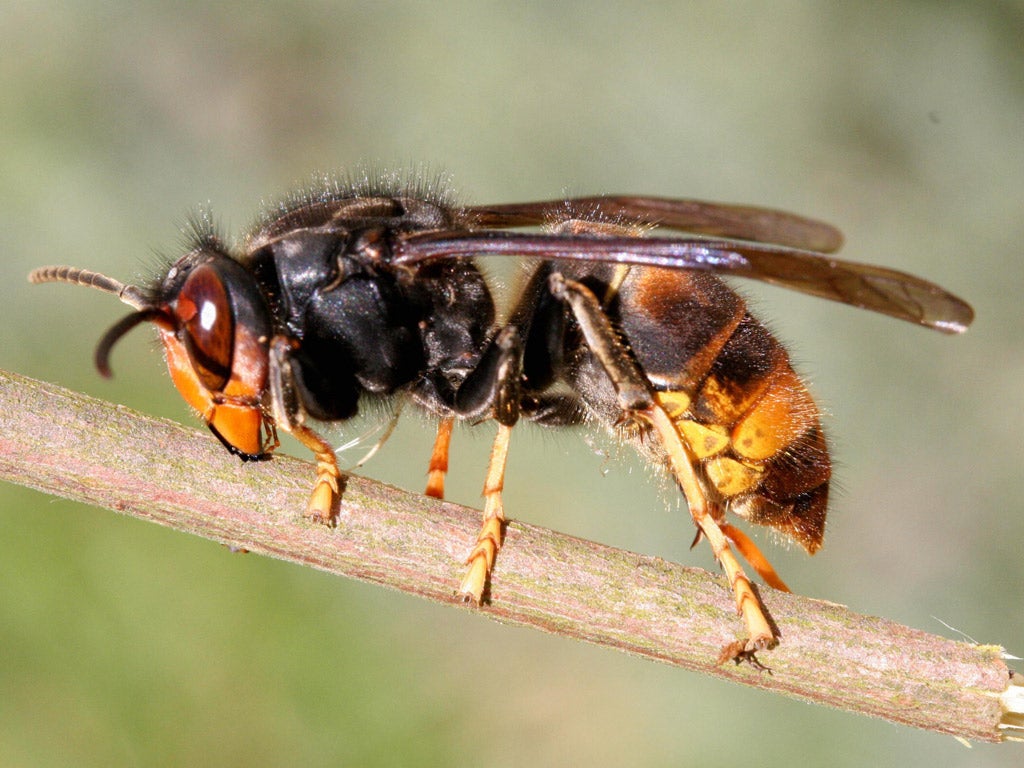Kill on sight! Fire at will! Battleplan to defeat deadly hornets heading for UK
Brian Brady and Jonathan Owen report on an imminent invasion threatening our bees

An emergency battle-plan has been drawn up to protect Britain's bees from marauding killer hornets that are poised to cross the Channel.
Government experts have developed measures to defend Britain against the aggressive Asian hornet, which has caused havoc in France. Experts say it is "highly likely" to spread across England and Wales in the near future.
Vespa velutina nigrithorax, which grows to 3cm, can destroy a bee colony in two hours. Officials have warned that the devastation could cost £440m per year.
But the Asian Hornet Response Plan concludes that the UK has little hope of stopping the creatures entering the country – either by crossing the Channel or in imported goods such as soil, wood products and fruit. The document being sent to beekeepers, landowners and local officials warns that hornet colonies should be poisoned, smoked out – or even shot down.
"It [is] unlikely that methods could be deployed to reduce the risk of the Asian hornet's entry to the UK," the document explains. "Instead measures [should] be put in place to initially intercept and prevent establishment. Beekeepers will be advised to introduce traps into their apiaries and restrict access points to hives."
Internal reports obtained by The Independent on Sunday detail alternatives discussed by officials, which include placing border officials on alert to inspect cargo and luggage, mass poisoning and destruction of colonies – costing hundreds of pounds.
Using rifles and water-cannons to shoot down nests was also discussed, with the warning that "if it is possible to kill... on sight, then do so".
The Non-native Species Programme Board warned that: "Colonisation is likely to be rapid if the species gets a foothold."
The National Bee Unit warned: "Potentially high costs would be incurred due to the impacts [hornets] are predicted to have on the beekeeping sector, the wider environment and the general public."
Government advisers have criticised the French response to the problem. Authorities there had nests shot down with rifles and told people to call out the fire brigade or their local council to deal with colonies.
An email from an official at the Food and Environment Research Agency suggested that UK ministers should take more powers to deal with the problem, but warned that they might not have the appetite to do so.
Predators that lay siege to hives
Asian Hornets grow up to 3cm long. They have dark brown or black bodies and brown legs with yellow ends. They hover in groups in front of beehives, catching single bees, tearing off their heads, wings and legs, and taking the remainder back to feed to their young.
As the attacks continue, the bee colony stops flying and has to consume its own stores, weakening it to the point where the hornets can enter the hive to ransack it.
Hornets usually build large nests in trees, but also live in garages, sheds and under decking.
Join our commenting forum
Join thought-provoking conversations, follow other Independent readers and see their replies
Comments
Bookmark popover
Removed from bookmarks